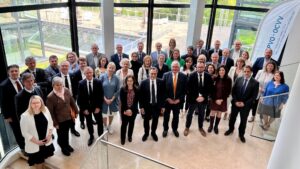We have seen the result of young people taking initiative: whether battling climate change or taking on human rights, there is no doubt that every sector has or will be affected by a young generation of forward thinkers who are looking to the future and want to see change.
It looks like the seed sector is no different.
Grow Scientific Progress is a citizens’ initiative looking for the EU to focus on sustainability, safety and responsible innovation when it comes to new plant breeding techniques. They are composed of a group of young Master’s students from eight EU member states who met during their studies at Wageningen University and Research. This initiative was started to foster responsible agricultural innovation in the EU. With backgrounds in food safety, food law, environmental studies, plant sciences, economics and biotechnology, they have joined forces to urge the European Commission to act to improve the outdated legislation on plant breeding in the EU.

“We founded the initiative as a group of nine Master students from eight different EU member states: Italy, Austria, Germany, Spain, Portugal, the Netherlands, Croatia and Greece. Our group has since then expanded, and we are now a group of 17 students,” explained Lavinia Scudiero, a veterinarian currently pursuing a Master’s in Food Safety Law and Regulatory Affairs. Scudiero co-founded the initiative with nine others, with the aim to implement in the EU more progressive and sustainable farming practices.
The initiative started out as a course assignment at Wageningen University and Research, where Scudiero and Martina Helmlinger, who is studying Safety in the Food Chain with a Food Law specialisation, analysed the legal debate around new plant breeding techniques after the recent EU Court of Justice ruling on mutagenesis techniques.
“With this comprehensive analysis of the EU GMO legislation, we came to the conclusion that the legislation in the EU is too restrictive to allow for much needed scientific progress,” said Helmlinger. “After talking with other like-minded Master students with different disciplinary backgrounds, we decided to get more active. We found out about the European Citizens’ Initiative as one feasible, democratic way, which requires to set up a committee of citizens resident in at least seven EU Member States. The international environment at WUR proved to be helpful in this endeavour, and we rapidly put together our committee.”
[tweetshare tweet=”The current EU GMO legislation is too restrictive to allow for much needed scientific progress.” username=”EuropeanSeed”]
It took about six months to explore several legal options, to inspect different opinions and to draft a legal proposal to submit with the European Commission last May. On the 25 July 2019, their initiative and the proposal were then officially registered by the Commission.
The group has expanded, currently with 17 students from different universities from several EU countries. Independence is a strong requirement for joining the committee, but the group welcomes any hard-working supporter who is enthusiastic about their initiative.
What exactly is a European Citizens’ Initiative?

Lilli Schütz, who is pursuing a Master’s in Crop Sciences, explains a European Citizens Initiative is an official tool that is available to any European citizen who wishes to influence EU-wide policies on particular issues.
“In other words, every European citizen can start a European Citizens’ Initiative on an issue which falls into the competencies of the European Commission,” Schütz says. “For this, at least seven citizens from different EU member states need to submit a proposal urging the European Commission to act upon a certain issue in a certain way. After submitting the proposal, the Commission has two months to state whether the initiative is admissible for registration. When the Commission decides that an initiative is admissible, the initiators have one year to collect one million signatures.”
[tweetshare tweet=”For a European Citizens’ Initiative the initiators have one year to collect one million signatures.” username=”EuropeanSeed”]
These signatures may come from citizens of all EU member states, while there are country-specific thresholds proportional to the respective populations which need to be reached in at least seven member states. If this happens, the European Commission needs to consider the proposal. They will decide whether to take action on the issues raised by the citizens, for instance by proposing a law, which would then be reviewed by the Parliament and the Council in the Ordinary Legislative Procedure. Their proposed law only comes into effect if they both accept it.
Why was it necessary to start this initiative?
“We started our initiative in response to the European Court of Justice ruling of last year that has resulted in an implicit ban of new breeding techniques for applications in EU agriculture,” Helmlinger explains. “ This ruling was largely criticized, but the underlying root problem is not the ruling itself which just gives an interpretation of the law, but the outdated Directive 2001/18/ EC on the deliberate release into the environment of genetically modified organisms on which the ruling was based.”

Scudiero says this Directive is clustered with vague definitions that do not reflect current scientific knowledge, and it stipulates a safety assessment procedure that is based on the applied techniques rather than the end products. This, she says, may lead to a situation where the same product is regulated strictly if obtained through NBTs, while it falls out of the scope of these strict laws when it has occurred as a result of randomly induced mutations. “The focus of our proposal is therefore to update the Directive and allow the responsible, transparent and safe use of novel breeding techniques by shifting the focus towards the end products.”
What is the proposal?
According to Helmlinger, their proposal is a legal draft to amend the technical annexes of Directive 2001/18 governing the deliberate release into the environment of GMOs.
“Within the proposal, we demand a clear distinction of mutagenesis based NPBTs and techniques resulting in conventional GMOs, as these techniques may yield principally dissimilar products”, says Helmlinger.
[tweetshare tweet=”We demand a clear distinction of mutagenesis based NPBTs and techniques resulting in conventional GMOs.” username=”EuropeanSeed”]
“Furthermore, we demand a more product-based risk classification of the resulting organisms rather than a technique-based one. This is because the risks are, if anything, associated with the product, and not with the technique to obtain the product, and the use of a certain technique alone does not justify the requirement of a stricter risk assessment.”
To achieve the enhanced focus on the product, the group suggests the establishment of a positive list of safe species-specific traits. This means that products of NPBTs shall require a notification rather than an authorisation if they include only traits on this positive list, as well as no foreign genetic material. Organisms with novel traits shall continue to be assessed for safety and shall require authorisation prior to cultivation.
“Overall, our changes to the Directive result in lower assessment stringency for products which are indistinguishable from those obtained through traditional breeding”, Schütz explains. “At the same time, the risk assessment requirements for products with novel traits are retained, and the update of these is not in the scope of our proposal.”
In regard to feedback from the industry at large, Scudiero says the proposal is just one possibility out of many more policy options, and they do not claim their proposal to be the only feasible solution to the problem.
“However, we strongly believe that it could be a first effective step for a timely change which may eventually lead to the much-needed update of current laws governing biotech innovations,” says Scudiero.“ We know that academics, institutions and the seed sector have also elaborated legislative proposals which partly resemble, and partly dissemble our proposal quite significantly. It is very plausible that the seed sector might not completely agree with every word of our proposal, or even some concepts, as our focus is only on mutagenesis based NPBTs. Nevertheless, we believe that they welcome our main goal to promote a fact-based debate.”
With their European Citizens Initiative, they want to involve the general public and bring yet another, strong voice to the debate to add another layer to the discussion. Only by inviting instead of excluding citizens in the fact-based debate, Grow Scientific Progress may bring the issue to the political agenda of the EU institutions, who will eventually have the ultimate power to decide. And with citizens in their back, they hope that changes may eventually be effectuated.
“But of course, it should be stressed here that our initiative marks just a first step in the update of the whole legislation, and we are convinced that the only the collaboration and joint efforts of similar movements can effectively lead to the changes we need so direly”, says Helmlinger.
Gathering voices…. And signatures
If Grow Scientific Progress manages to gain enough supporters, they will submit the initiative to the Commission who will then organize a public hearing. Within three months after submission, the Commission will pursuethe action it intends to take, if any, andtheirreasons for taking or not taking that action.Depending on the type of action, this will start a whole procedure of steps. For instance, if they decide to open Directive 2001/18/EC and include their proposal therein, the Parliament and the Council will decide upon that proposal within theOrdinary Legislative Procedure. Hence, it is also crucial to promote their cause with decision-makers in these bodies of the EU who have the power to decide.
“We are convinced that it will take the voice of as many citizens as possible to ask for these changes to be effectuated in this procedure, so obtaining enough signatures will not mark the end of the initiative, but more the start to the next level and we will continue to make our voice heard for this crucial cause”, Schütz says.“And eventually, we hope that our proposal is accepted. It may pave the way for a less cumbersome authorisation procedure, which would be replaced by a notification procedure only for those techniques which are mutagenesis-based, the products of which bear no foreign genetic material and hold only changes which may have occurred naturally.”
How can people help?
Grow Scientific Progress is a young, small, independent, student-led initiative, and as such, they are aware they can only do so much. But they have a strong will and a clear vision: To stop the implicit bans which have been imposed on the invaluable tools of NBTs in the EU for a better agricultural future in the EU.
“And we depend on anyone who shares this vision to sign our initiative and spread the word,” states Helmlinger.“ One million signatures will not collect themselves, so any input, any sharing, any promotion is highly appreciated! Also, we are still expanding and looking for motivated students to help us set up campaigns in all EU member states. Because first and foremost, raising awareness is key, communicating is essential and discussing is paramount if we wish to make people understand the importance of our cause. We really hope to help spark a fact-based, respectful debate which brings this issue to the political agenda and marks a turning point in the regulation of sustainable, responsible agricultural biotechnological progress in the EU.”
Why Is This Necessary?
According to Scudiero, Schütz and Helmlinger, this is necessary for the following reasons:
The EU misses out on a tool with a great potential
There is vast scientific consensus that novel breeding techniques (NBTs) represent one pathway towards a sustainable, wholesome agriculture in the future. NBTs may help us face challenges like population growth and climate change, by breeding climate-resilient crops with higher yields. Meanwhile, NBTs may reduce the use of pesticides, resources and land, by generating crops which are resilient to environmental stress. Ultimately, this will result in better land use and reduce the need to transform forests and other ecosystems into agricultural land. This will protect biodiversity and help sequester more carbon dioxide. Furthermore, NBTs may help to provide safer and more nutritious foods to consumers. To name a few examples: by improving resistance to fungal infections, toxin contaminations can be decreased, or by reducing the gluten content in wheat, it can be made more accessible for a larger population (for a nice list, please see: https://www.dialog-gea.de/de/themen/inhalte/2018-10-05-diese-pflanzen-sind-genomeditiert by the Julius Kühn Institute). However, all these benefits are unlikely to be exploited on EU grounds as the legal regime is extremely strict and limiting, resulting in an implicit ban of these techniques for EU agriculture.
Disproportionate burden and lack of enforceability
This current law places a disproportionate burden on NBTs – even those which lead to the same products that could have been made with conventional techniques. For this reason, these very strict laws cannot be enforced at the moment. According to Heidi Ledford (https://www.nature.com/articles/d41586-019-02162-x) and many others, it simply cannot be determined whether the mutation has occurred spontaneously or in an induced manner. This means that there is vast regulatory uncertainty, especially with regards to imports and to labelling of products obtained from mutagenesis techniques. In other words, European farmers will have a disadvantage on the global and EU market, as more competitive crops from non-EU markets obtained by NBTs may not be properly labelled and enter the EU anyway. A lack of a legal update will also lead to more problems with new breeding methods that may be developed in the future.
Looking to the future
And last but not least, our group feels that it was necessary to start this initiative from a personal perspective. We are all young EU citizens, with long futures ahead. As such, we are concerned about challenges that will face us in the future, such as climate change, resource scarcity and food insecurity. We choose to actively promote responsible scientific progress in the EU to tackle these challenges. Thus, we and other generations will profit from a legal framework that will foster the faster development of more nutritious, safer and more resilient crops whilst saving resources and the environment.
Editor’s Note: The Initiative needs your signature. The website where you can express your support for this initiative is: https://www.growscientificprogress.org/














